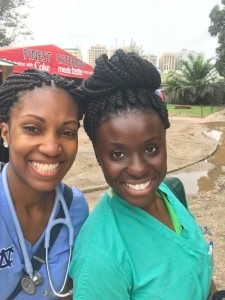Tanzanian Training Shows Medical Student Celeste A. Brown Universal Health Barriers
April 27, 2018
Institute for Global Health and Infectious Diseases
Celeste A. Brown is a fourth-year medical student at the University of North Carolina at Chapel Hill, and will begin her residency in obstetrics-gynecology at Carolina in June. Celeste traveled to Tanzania and Mozambique for a one-month emergency medicine rotation, and below she shares a global perspective on the state of healthcare and medical education at home and abroad.
My Stone Fellowship award afforded me the opportunity to visit Tanzania and Mozambique for a one-month global health elective. Learning alongside medical students and emergency medicine residents at Muhimbili National Hospital (Muhimbili, MNH) in Dar es Salaam, Tanzania, was an enriching and eye-opening experience to say the least.
Most of our mornings started with patient rounds and morning report, reviewing workups and differentials on interesting patients that had come into the emergency department (ED) the night before. The patients we saw presented with a wide range of acute complaints; we stabilized children with seizure disorders and congenital heart defects, splinted broken arms and ankles after motorcycle crashes, and practiced our ultrasound techniques on the fly whenever an ascites-filled abdomen presented itself. Though it was a crowded learning environment, as a fourth-year medical student, this was a prime opportunity to practice being a teacher as well as a learner since there were so many levels of expertise within our team. The emergency department at MNH is one of the most advanced in the region, and certainly a trailblazer in terms of medical education, as the first residency program at Muhimbili. We learned alongside the local residents, plus residents from Mozambique, students from Australia, residents and fellows from North Carolina and California.
As a future OB/GYN, I also was eager to explore the maternity ward at Muhimbili. Two days in, the maternal ICU granted me exposure to complex pathology that we may not often see in the U.S. This was “hands-on training” at its most literal and sobering: on our final day, we participated in a code on a patient with metastatic gestational trophoblastic disease, and learned quickly how complex it can be to adhere to our training in advanced cardiovascular life support, particularly in a setting without a defibrillator present.

Learning the workflow at Muhimbili was more foreign to me than the patients we encountered, as the chief complaints closely mirrored those I’d seen in my clerkships in the Charlotte Longitudinal Integrated Curriculum. What became very clear is that poverty and lack of access to care is a universal barrier to excellent health, and that we should pause when tempted to blame “low resources” or “developing nations” as the scapegoat. Through conversations and seeing patients with the residents and medical students, I learned how similar, and how devastating, patients’ outcomes can be when they have poor access to healthcare, regardless of their country of residence. There was lots of advanced pathology at MNH, but many of the people we took care of could have just as well presented to the ED in Charlotte or in Chapel Hill; it re-energized my commitment to taking care of underserved patients wherever I may encounter them, and reminded me I do not have to travel across the world in order to make an impact in this field.
In our time off from the ED, I had the privilege of exploring the gorgeous, lush green Tanzanian countryside, and to visit local restaurants and shopping markets in Dar. From Bagamoyo Island to Kendwa, Zanzibar, we felt some of the finest, softest sand beneath our feet, and indulged in some of the richest and most savory meals I’ve ever had the pleasure of tasting. I had an unexpected, but very welcome sensation during my trip; it felt like déjà vu in a place I’d never been before. But because of our shared heritage and the overwhelmingly generous hospitality of our hosts, I felt right at home. I went on this trip with my classmate and close friend, which also added to the feeling of being safe and welcome, and even encouraged me to step outside my comfort zone a little more than I usually would.
Our final week on the continent was spent in Mozambique, where we explored the capital city. Along with my UNC-Chapel Hill classmate, a friend in the Peace Corps and another friend who works in women’s health research, I explored Maputo and a small island off the coast. We participated in everything from boat tours and beach hikes to a women’s empowerment seminar, discussing behavioral research relating to HIV and program evaluation in rural Mozambique. Overall, this month full of cross-cultural study was a defining month in my medical education and in my life. I am beyond grateful to the Stone family for their generosity, which helped me to complete this trip, and look forward to contributing toward a student’s introduction to global health in the years to come.
